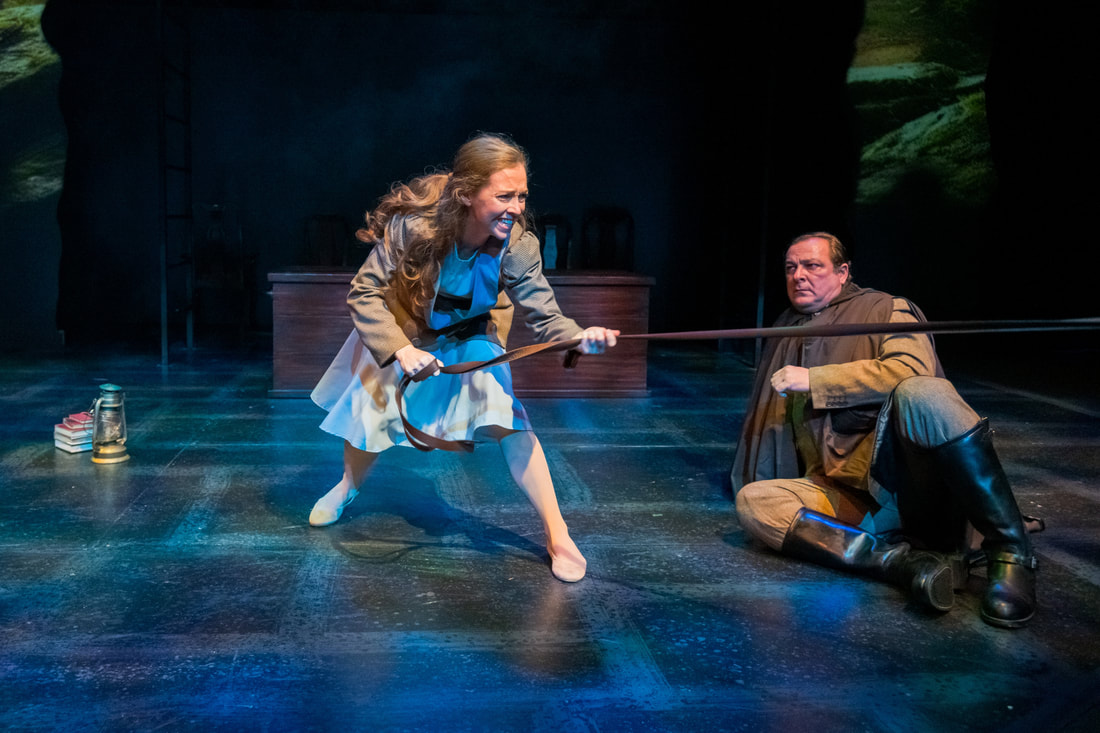|
Natasha Harris and Manny Fernandes in "Jane." Photo courtesy of Lamb's Players Theatre It’s been Day 2 on my Governesses-in-Distress tour. First it was Chalk Circle Collective’s production of Henry James’, by way of adapter Jeffrey Hatcher, “The Turn of the Screw,” wherein a governess at an English estate battles ghosts.
Now it’s Lamb’s Players Theatre’s production of David McFadzean’s adaptation of Charlotte Bronte’s “Jane Eyre,” subtitled “A Ghost Story,” wherein a governess at an English estate fights an ardent war between head and heart. Though “Jane” calls itself a ghost story, it really isn’t. In spite of winnowing down a massive Gothic novel into a two-hour play with music, McFadzean’s adaptation isn’t really spooky at all. Yeah, there are some masked gargoyles that effectively appear and reappear from the rafters and make ghoulish noises; and yes, a burly madwoman resides on the third floor of Bronte’s Thornfield Hall. But the world premiere at Lamb’s is pretty non-ghostly and in the main faithful to the original novel, pared down though the script is. The focus is on heroine Jane (Natasha Harris): shunned as deceitful (with absolutely no reason why) by her snooty aunt, Lady Reed (Cynthia Gerber); banished to the Lowood Institution for orphaned girls where her first friendship, with the sweetly diffident Helen Burns (Lizzie Morse) ends tragically; and becoming governess to the precious Francophile ward (Morse again) of the unseen Mr. Rochester (Manny Fernandes) at Thornfield Hall. Devotees of “Jane Eyre” the novel know this long and winding tale all too well, how Jane’s disdain for Mr. Rochester turns to love, how their planned marriage is undone by his admission that his insane living wife resides on the third floor of the estate, how after departing destitute she is taken in by a cleric (Sam Ashdown) and his family when all seems lost. And then there’s the dramatic ending and denouement, which I won’t give away here. You Bronte disciples know it well. Lamb’s’ production directed by Robert Smyth is stylish and absolutely enhanced by the wide variety of vocal music, a staple of productions by this company, gifted as it is with so many fine singers in its rotating repertory. These interludes add beauty and poignancy to many moments during the storytelling. The setting for this McFadzean adaptation is the 1920s, a significant departure from the original novel’s unspecified time frame, though presumably Bronte intended it to be the mid- to late 1800s. In “Jane’s” world, a convenient phonograph plays standards of the ‘20s like Irving Berlin’s “Always.” Characters communicate on a telephone. But this doesn’t feel like a 1920s story; rather, it has all the grim and proper Gothic trappings of its source material. There are some fine performances on display at Lamb’s. The dependably professional Sandy Campbell plays two roles, including the estate housekeeper Mrs. Fairfax. Lamb’s regulars Caitie Grady, Jordan Miller and Gerber are equally at home in this production. As the domineering but tortured Rochester, Fernandes is much more convincing in the second act than in the first. Even so, he never achieves very believable chemistry with Harris. Re: Harris, she’s a strong, independent and credible Jane Eyre throughout. The only problem is the heavy accent Harris adopts during the production, one that waffles between near-Cockney and near-Scottish. It wouldn’t be so mitigating were ANY of the other actors using an accent this noticeable. As such, Harris seems to be performing in an altogether different play part of the time. I took a true “Jane Eyre” fan with me to the show, and she had mostly praise for the production. I’m not a fan, but I can with confidence say the same: Lamb’s’ “Jane” is diverting and, in spurts, touching. The live musical interludes, an inspired idea to begin with, make it more than just another adaptation that might otherwise somewhat disappoint purists. “Jane” runs through Nov. 12 at Lamb’s Players Theatre in Coronado.
0 Comments
Leave a Reply. |
AuthorDavid L. Coddon is a Southern California theater critic. Archives
July 2024
Categories |
David Coddon |
|
